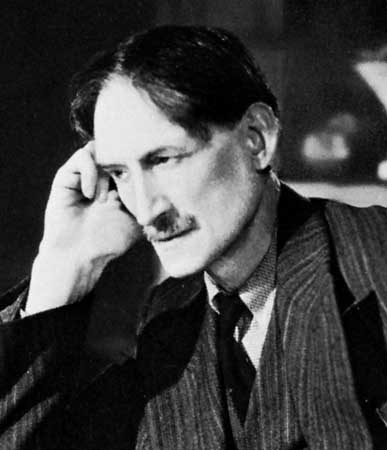Barbusse, Henri
French author
born May 17, 1873, Asnières, Fr.
died Aug. 30, 1935, Moscow
 novelist, author of Le Feu (1916; Under Fire, 1917), a firsthand witness of the life of French soldiers in World War I. Barbusse belongs to an important lineage of French war writers who span the period 1910 to 1939, mingling war memories with moral and political meditations.
novelist, author of Le Feu (1916; Under Fire, 1917), a firsthand witness of the life of French soldiers in World War I. Barbusse belongs to an important lineage of French war writers who span the period 1910 to 1939, mingling war memories with moral and political meditations.Barbusse started as a neo-Symbolist poet, with Pleureuses (1895; “Mourners”), and continued as a neo-Naturalist novelist, with L'Enfer (1908; The Inferno, 1918). In 1914 he volunteered for the infantry, was twice cited for gallantry, and finally was discharged because of his wounds in 1917. Barbusse's Le Feu; journal d'une escouade, awarded the Prix Goncourt, is one of the few works to survive the proliferation of wartime novels. Its subtitle, Story of a Squad, reveals the author's double purpose: to relate the collective experience of the poilus's (French soldiers') life in the trenches and to denounce war. The horror of bloodshed and destruction led Barbusse to an indictment of society as a whole. He became a pacifist, then a militant Communist and a member of international peace organizations. After Clarté (1919; Light, 1919), his literary production acquired a definite political orientation. His last work, Staline (1935; Eng. trans., 1935), was partly written in the Soviet Union, where he was living at the time of his death.
- Longinus
- Long Island
- Long Island, Battle of
- Long Island Rail Road Company
- Long Island Sound
- longitudinal wave
- long jump
- long-legged fly
- Long March
- Longmen caves
- long metre
- Longmont
- Longmyndian
- Longomontanus, Christian
- Long Parliament
- long-period variable star
- Long Point
- Longqing
- Longquan ware
- Long Range Mountains
- Longshan culture
- longship
- Longs Peak
- Longstreet, James
- Longton Hall porcelain